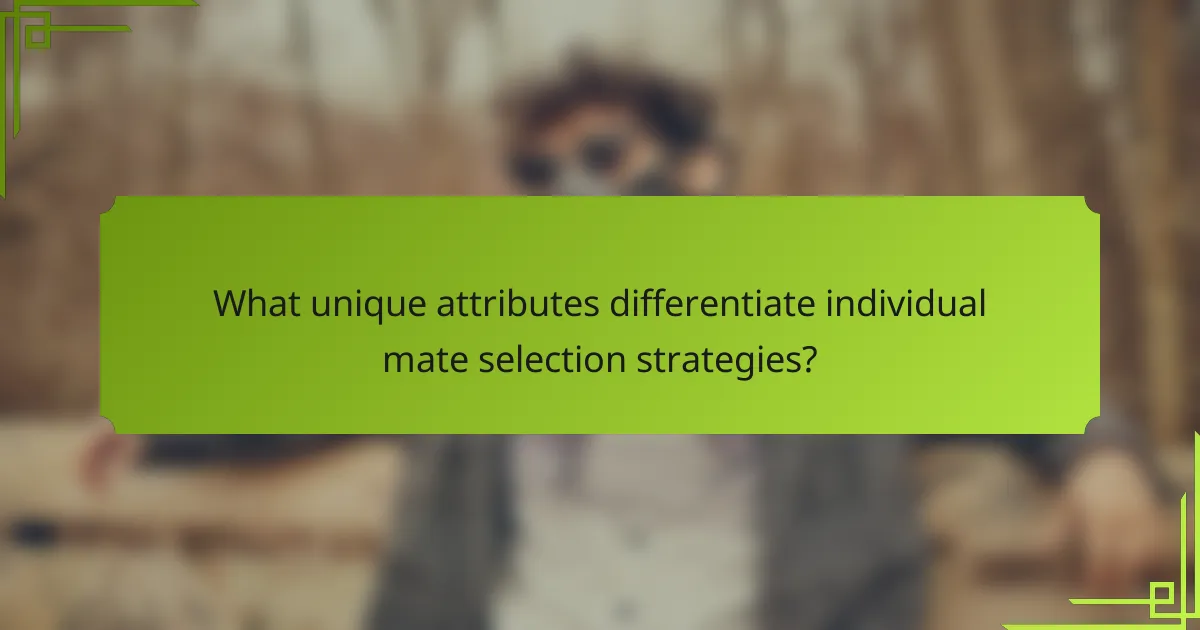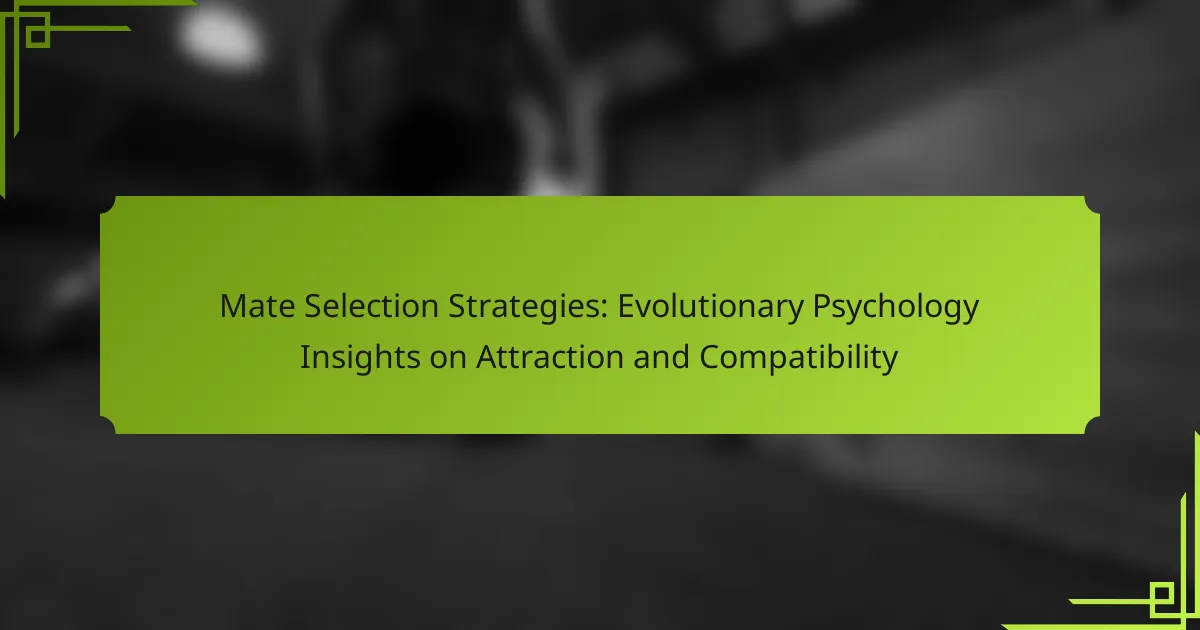Understanding mate selection strategies can enhance relationship satisfaction and outcomes. Key factors include attraction based on evolutionary psychology, compatibility through shared values, and the influence of social dynamics. Individual preferences vary by personal values and cultural backgrounds, while unique attributes like communication styles can deepen connections. Recognizing these elements provides valuable insights into attraction and compatibility in human relationships.

What are the key principles of mate selection strategies?
Key principles of mate selection strategies include attraction based on evolutionary psychology, compatibility, and social dynamics. Individuals often seek partners who exhibit traits indicating genetic fitness, such as physical health and social status. Additionally, emotional intelligence and shared values enhance compatibility. Social circles and cultural influences also play a significant role in shaping preferences and choices. Understanding these factors can improve relationship outcomes and satisfaction.
How do evolutionary psychology theories explain attraction?
Evolutionary psychology theories suggest that attraction is driven by biological imperatives aimed at enhancing reproductive success. Factors such as physical appearance, health indicators, and social status play crucial roles in mate selection. These preferences are rooted in ancestral environments where traits signifying fertility and resource availability were prioritized. Unique attributes, like symmetry in facial features, are often associated with genetic fitness, influencing attraction. Additionally, compatibility is enhanced through shared values and interests, which can lead to long-term partnerships and successful offspring rearing.
What role does compatibility play in mate selection?
Compatibility significantly influences mate selection by fostering emotional connection and long-term relationship stability. Research indicates that individuals often prioritize shared values, interests, and life goals, which enhance compatibility. This alignment leads to greater relationship satisfaction and reduces conflict. Unique attributes, such as personality traits, also play a crucial role, as they can either complement or clash with a partner’s characteristics. Ultimately, compatibility acts as a foundation for attraction, guiding individuals toward partners who fulfill their emotional and psychological needs.

What universal attributes influence mate selection?
Mate selection is influenced by universal attributes such as physical attractiveness, social status, and compatibility. These factors play crucial roles in determining partner preferences across cultures. Physical attractiveness often signals health and genetic fitness, while social status can indicate resource availability. Compatibility, including shared values and interests, fosters long-term relationship success.
How do physical traits impact perceived attractiveness?
Physical traits significantly influence perceived attractiveness, impacting mate selection strategies. Symmetry, body shape, and facial features are key attributes that signal health and genetic fitness. Research indicates that individuals often prefer symmetrical faces, associating them with better overall health. Additionally, traits like height and body mass index can affect desirability, with cultural variations influencing these preferences. Overall, physical attributes serve as vital cues in the complex dynamics of attraction and compatibility.
What psychological traits are commonly sought in partners?
Psychological traits commonly sought in partners include emotional stability, kindness, and intelligence. These traits enhance relationship satisfaction and compatibility. Emotional stability fosters resilience during conflicts, while kindness promotes empathy and support. Intelligence often correlates with shared interests and stimulating conversations, making it a unique attribute in mate selection. Research shows that individuals prioritize these traits to ensure long-term relationship success.
How does socio-economic status affect mate choices?
Socio-economic status significantly influences mate choices by shaping preferences for partners with similar or higher status. Individuals often seek mates who can enhance their social standing or provide economic stability. Studies indicate that people from higher socio-economic backgrounds prioritize traits like education and career success in potential partners, while those from lower backgrounds may focus more on emotional support and shared values. This dynamic reflects the evolutionary psychology perspective, emphasizing compatibility and resource acquisition in mate selection.

What unique attributes differentiate individual mate selection strategies?
Individual mate selection strategies are differentiated by unique attributes such as personal values, social status, and genetic compatibility. These factors influence attraction and compatibility, shaping preferences in partner choice. For example, some individuals prioritize emotional intelligence, while others may focus on physical appearance or shared interests. Additionally, cultural background can create unique strategies, as norms and expectations vary across societies. Understanding these attributes helps clarify the complexity of mate selection processes.
How do cultural backgrounds shape attraction preferences?
Cultural backgrounds significantly influence attraction preferences through shared values and norms. These factors shape what individuals find appealing in potential mates. For instance, collectivist cultures often prioritize traits like family orientation, while individualistic cultures may value independence and personal achievement. Research indicates these preferences can lead to compatibility in relationships, as partners align on culturally relevant attributes. Understanding these dynamics can enhance mate selection strategies by highlighting the importance of cultural context in attraction.
What is the significance of personal values in mate compatibility?
Personal values are crucial in mate compatibility as they shape individual preferences and relationship dynamics. Shared values enhance emotional connection and understanding, leading to greater relationship satisfaction. For instance, couples with aligned beliefs about family, career, and lifestyle often experience stronger bonds. Unique attributes, such as personal growth and ethical beliefs, can further influence attraction and long-term compatibility. Thus, personal values serve as a foundational element in successful mate selection strategies.

What rare attributes can enhance mate selection effectiveness?
Rare attributes that can enhance mate selection effectiveness include unique communication styles, uncommon hobbies, and distinctive problem-solving approaches. These traits can create deeper connections and attract partners by showcasing individuality. For example, a preference for adventure travel may appeal to those seeking excitement in a relationship. Additionally, emotional intelligence, while not rare, can significantly differentiate candidates, fostering compatibility and understanding. Overall, these rare attributes contribute to a more compelling mate selection process.
How do uncommon hobbies or interests influence attraction?
Uncommon hobbies or interests can enhance attraction by showcasing unique personality traits. Individuals with distinctive interests often appear more intriguing and confident, which can increase perceived compatibility. Unique hobbies may signal creativity and openness, traits that many find appealing in potential partners.
What role does emotional intelligence play in mate selection?
Emotional intelligence significantly influences mate selection by enhancing communication and understanding between partners. Individuals with high emotional intelligence can better recognize and respond to their partner’s emotional needs, fostering deeper connections. This ability promotes compatibility, as partners can navigate conflicts more effectively and support each other’s growth. Research indicates that emotional intelligence correlates with relationship satisfaction, highlighting its importance in selecting a compatible mate.
How can high emotional intelligence improve relationship dynamics?
High emotional intelligence enhances relationship dynamics by fostering deeper understanding and empathy. Individuals with high emotional intelligence can effectively communicate feelings, manage conflicts, and build stronger connections. This ability to navigate emotions leads to greater compatibility and attraction in mate selection. As a result, partners are more likely to feel secure and valued, improving overall relationship satisfaction.

What are the regional perceptions of attraction and compatibility?
Regional perceptions of attraction and compatibility vary significantly across cultures. These differences influence mate selection strategies, shaped by evolutionary psychology. For example, in collectivist societies, family approval plays a crucial role, while individualistic cultures prioritize personal choice. Additionally, physical traits may be emphasized in some regions, whereas personality compatibility is valued in others. These unique cultural attributes highlight how attraction and compatibility are not universally defined but are influenced by social norms and values. Understanding these regional variations can enhance insights into human relationships and mating behaviors.
How do local dating practices affect mate selection strategies?
Local dating practices significantly shape mate selection strategies by influencing preferences for attraction and compatibility. Cultural norms dictate what traits are valued, such as physical appearance, social status, or shared interests. For instance, in collectivist societies, family approval often plays a crucial role in mate selection, prioritizing long-term compatibility over short-term attraction. Additionally, unique attributes like regional traditions can create distinct dating rituals that affect partner choices. As a result, individuals adapt their strategies based on local customs, leading to varied approaches in different cultural contexts.
What cultural differences exist in the understanding of attraction?
Cultural differences significantly influence the understanding of attraction. In collectivist societies, family approval and social harmony often dictate mate selection, while individualistic cultures prioritize personal choice and romantic love. For example, arranged marriages are common in some cultures, emphasizing familial ties over personal preference. Additionally, perceptions of physical attractiveness vary, with some cultures valuing body size and others favoring slenderness. These variations highlight unique attributes in attraction across different societies. Understanding these cultural nuances is essential for exploring compatibility in relationships.

What are the best practices for optimizing mate selection strategies?
To optimize mate selection strategies, focus on enhancing attraction and compatibility through understanding evolutionary psychology. Prioritize traits that signal genetic fitness, such as physical health and social status. Additionally, consider shared values and interests, as these foster long-term compatibility. Emphasize emotional intelligence, as it plays a crucial role in relationship satisfaction. Lastly, be aware of the impact of social and environmental factors on mate preferences, as they can significantly influence choices.
How can individuals identify their own attraction patterns?
Individuals can identify their attraction patterns by reflecting on their past relationships and preferences. Analyzing traits that consistently draw them to potential partners reveals underlying compatibility factors. Recognizing emotional responses and physical attraction can clarify these patterns. Additionally, understanding evolutionary psychology insights, such as the importance of genetic diversity and social status, can further enhance self-awareness in mate selection. Engaging in open conversations about relationship dynamics can also provide valuable feedback on attraction tendencies.
What common mistakes should be avoided in mate selection?
Avoiding common mistakes in mate selection enhances attraction and compatibility. Key errors include prioritizing superficial traits over deeper compatibility, ignoring red flags in behavior, and rushing into commitment without adequate understanding of each other. Focusing on shared values and communication styles leads to healthier relationships. Additionally, overlooking the importance of emotional intelligence can hinder long-term success.
What expert insights can enhance compatibility assessments?
Expert insights can enhance compatibility assessments by focusing on psychological traits and evolutionary factors that influence attraction. Understanding preferences for traits such as kindness, intelligence, and physical attractiveness can refine mate selection. Research indicates that individuals often prioritize long-term compatibility over short-term attraction. Additionally, assessing shared values and life goals increases relationship satisfaction. Emphasizing emotional intelligence and communication skills can lead to stronger connections. Overall, integrating these insights into compatibility assessments fosters healthier, more fulfilling relationships.
